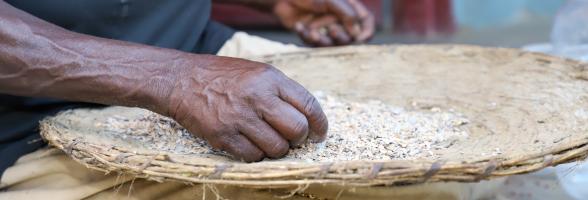CONTEXT
The Karamoja sub-region of Uganda covers an area of 27,528 sqkm and includes the districts of Kotido, Kaabong, Karenga, Nabilatuk, Abim, Moroto, Napak, Amudat, and Nakapiripirit. According to data from the Uganda Bureau of Statistics (UBOS) 2022, the region is home to approximately 1.4 million people.
The region faces significant water scarcity issues as most water sources are seasonal and heavily affected by the unreliable and uneven rainfall, leading to prolonged periods of extreme dry spells.
Over the past 35 years, the region has experienced an increase in average monthly rainfall with rising temperatures also a critical concern, as highlighted by the 2017 World Food Programme (WFP) report titled "Impacts of Climate Change on Food Security and Livelihoods in Karamoja."
The report also highlights that many residents remain unaware of the long-standing climate changes affecting their environment, while those who recognise these shifts often lack the knowledge or resources to adapt effectively. In some cases, communities have resorted to unsustainable practices such as selling charcoal and firewood in response to agricultural failures, rather than adopting effective adaptation strategies.
Climate extremes in Karamoja, such as unpredictable rainfall patterns, bushfires, droughts, floods, and landslides, are becoming more frequent and intense. These extremes threaten the livelihoods, food security, and overall social stability of the region, which is classified as semi-arid and dependent on its communal forests.
Current estimates from the World Bank Food Security Update 2025, indicate that 61.6m people are currently food-insecure in East Africa while nearly 50m people are projected to face food insecurity in Western and Central Africa with Karamoja particularly hard-hit.
As of June 2024, all nine districts in the Karamoja sub-region are classified in IPC Phase 3 (Crisis), with 45% of the population analysed (600,000 people) facing high levels of acute food insecurity according to the Integrated Food Security Phase Classification (IPC).
The worsening food security crisis, intensified by drought conditions, highlights the urgent need for comprehensive and coordinated interventions aimed at addressing these interlinked challenges of climate change, water scarcity, and food insecurity in the Karamoja sub-region.
ABOUT THE PROJECT
With funding from the KANE Family, Oxfam in Uganda, and Warrior Squad Foundation are implementing the Karamoja Agro-Pastoral Resilience and Empowerment Project KAREP) in Kotido district.
The 3-year project aims to promote Climate Smart Agriculture, Women Economic
Empowerment (CSA-WEE) and sustainable livelihoods for smallholder farmers, especially women. This will be achieved by enhancing climate-resilient food production, improving access to agricultural inputs, and integrating climate-resilient value chains.
Additionally, KAREP will focus on rehabilitating and protecting degraded ecosystems through initiatives such as Cash for Work. It will also integrate Village Savings and Loan Associations (VSLA) into Agricultural Producer and Farmer Field School (APFFS) activities, manage livestock diseases, and support Community-Based Rangeland Management. The project will also strengthen income- generating activities.
PROJECT AIM
- Resilient and sustainable livelihoods for smallholder farmers in the Karamoja Sub region.
EXPECTED RESULTS
- Increased food security for small holder farmers especially women and youth.
- Increased income security for small holder farmers.
- Enhanced capacity of smallholder farmers to adapt to climate change impacts
IMPLEMENTING PARTNER
- Warrior Squad Foundation
KEY STAKEHOLDERS
- Small Holder Farmers.
- District technical teams.
- Water User Committees.
- Community Animal Health Workers
- Producer Marketing Groups. Community Based Financial Services
PROJECT DURATION
- 3 Years
TOTAL BUDGET
- $1,100,000
FUNDED BY.
- KANE Family
